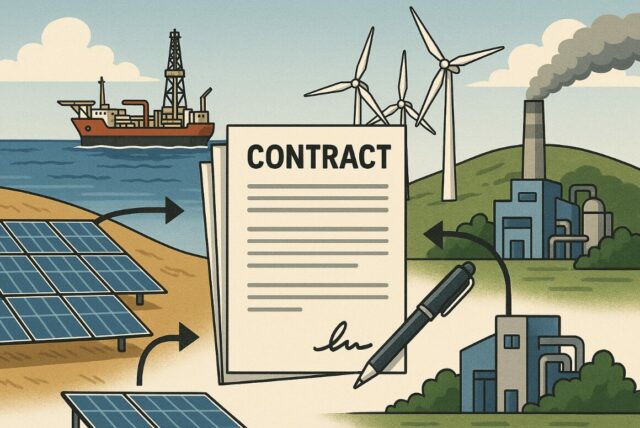Everyone – or almost everyone – dreams of having a contract manager in their team, don’t they? The obstacle often lies in allocating a budget for a function that is still new, often unknown and sometimes wrongly associated with a cost centre. After all, why invest in an expert whose impact is not always immediately apparent? And yet, if you wait too long, there’s a real risk that your projects will get out of hand, costs will soar and, of course, margins will shrink. So when should you take the plunge and integrate a contract manager into your organisation?
In this article, we won’t give you a magic bullet – we believe that every organisation is different – but we will try to answer the question from two angles that should put you on the right track and help you find your answer: the complexity of your activities, on the one hand, and the size of your contracts, on the other. With these two criteria in mind, you will be able to assess whether the time has come to install this key function in your organisation.
I. The level of complexity of your business: fertile ground for the contract manager
a. Understanding the challenges of complexity
Companies operating in complex environments – be they technology engineering projects, infrastructure construction or energy sector deployments – are regularly faced with a multitude of constraints: demanding regulations, high technical risks, multiple stakeholders, etc. This accumulation of factors makes contract management particularly tricky. This accumulation of factors makes contract management particularly tricky.
In these environments, the presence of a contract manager makes perfect sense. Without going so far as to reiterate the importance of contract management, the contract manager will be able to intervene at every stage of the contract life cycle to understand the risks and opportunities throughout these complex contracts. The role of the contract manager in these complex environments goes well beyond simply monitoring contractual obligations: the contract manager is also a facilitator, both internally between the various teams (technical, legal, financial, etc.) and externally with all the stakeholders, who are often numerous in these environments.
b. A few examples to illustrate
Energy: Imagine a project to build an energy production unit. The challenges are many: managing often international subcontractors, complying with environmental standards, investment volumes, financial issues, etc. In this context, an experienced contract manager will be your project manager’s best ally in preventing deviations, assessing and limiting the effects of delays and other contingencies, reducing your exposure to contractual penalties and identifying opportunities to optimise your margins.
Construction: In construction projects, the sub-division of projects, coordination between several trades (civil engineering, electricity, plumbing, architecture, etc.) and the coexistence of public and private players can quickly become a headache. Amendments to the contract are legion, and every delay has a domino effect on the overall timetable, not to mention the HSE issues that are always a priority but sometimes overlooked. Without solid management of the contractual aspect, the risks of cost explosion or claims multiply.
IT and Technology: IT and R&D projects involve methodologies and technologies that are constantly evolving, making real-time adjustments necessary, whether to deal with obsolescence, new technological opportunities, or even the impossibility of meeting the promise of an offer or the requirements of a specification. And every adjustment has contractual consequences (revision of specifications, deadlines, budget). A contract manager can help you lock in changes while maintaining the necessary agility. In these areas, the added value of a contract manager is almost immediate: he or she secures contractual relations and protects the company from both operational and financial drift. The greater the complexity, the more vital this role becomes.
II. Contract value: a selection criterion that is as simplistic as it is effective
If the complexity of your activities is already a good reason to integrate the contract management function, the size of your contracts is just as important. In a macroeconomic context where profitability is a key issue, the challenge is clear: how can you ensure control of large (and often costly) projects without jeopardising an organisation’s finances and reputation? There’s only one answer: contract management
a. Contract manager: guardian of project P&L
We talked about complexity above, but even in less complex fields, entrusting the management of a large contract to a contract manager can be justified, at least as soon as the financial stakes are high. The higher the value of the contract, the greater the risk of misunderstandings, deviations or disputes, which can have serious consequences for the profitability of a project, and more generally for a company.
On the scale of a major contract, just a few margin points can represent gains or losses of several million euros. By rigorously monitoring contractual obligations (payment deadlines, deliverables, performance clauses), the contract manager can act as the link between management control, the project manager and the legal experts, ensuring that margins are preserved by avoiding costly penalties, monitoring payment deadlines, and providing a regular, in-depth assessment of risks and opportunities, enabling a finer reading of the provisions to be set aside or released.
At a time when cash is less readily available and credit lines are more expensive than they were a few years ago, the integration of a contract manager, and more generally of contract management within organisations, can be seen as a ROI opportunity. The integration of a contract manager is a profitable investment, since the cost is often more than offset by the savings made (disputes avoided, delays minimised, advantageous clauses negotiated, etc.) and, more generally, by the improved profitability of projects.
b. A cross-functional function to secure the execution of major contracts
The sums involved in mega-projects (infrastructure, energy, defence, etc.) can be staggering and involve a constellation of stakeholders: project owners, suppliers, subcontractors, insurers and public authorities. The complexity of these relationships often becomes a headache, with each player having its own priorities, constraints and contractual obligations.
In these contracts, over and above the ROI issue mentioned in paragraph a. above, it is essential to ensure that there is a ‘bond’ between these different stakeholders on activities that are often neglected because they are not a priority for other functions.
First of all, in terms of collaboration, while the project manager ensures the collaboration of the various players involved in the project, the contract manager ensures the counterpart from a contractual point of view, with interlocutors who are often different within the organisations concerned. This collaboration allows things to be said at the right time and in the right way, rather than omitting subjects and only broaching them once it’s too late
Secondly, when it comes to adapting the contract to the reality of the project, the contract manager also plays the leading role. Over the course of a major project, which can take many years to complete, the initial contract may have to be adjusted to take account of technical hazards, regulatory changes or new demands from the customer. Each change needs to be accurately recorded to avoid any grey areas or subsequent conflicts, and this is where the contract manager occupies a key position, since it is not occupied in his absence.
In short, the longer, more complex and more expensive the contracts, the more the contract management function appears to be a key success factor, with an ROI that is all the greater if the contract manager is involved from the outset( ideallyfrom the invitation to tender stage ). Without this “contractual conductor”, the risks of a mismatch between strategic vision and operational execution increase exponentially.
So when (and how) should you take the plunge?
We warned you at the start of this article that there is no single answer to the question “When should you create a contract management function? The answer will depend on a number of factors, such as the nature of your business (more or less complex), the value of your contracts (more or less), the type of customer you have and the maturity of your organisation when it comes to contracts.
We hope, however, that this article has helped you to see things more clearly. The two key factors mentioned (complexity and contract size) are in fact universal. To take things a step further, we’d like to suggest a checklist. Ask yourself the questions below:
- Does my project/contract represent more than 30% of your company’s total turnover?
- Is my project/contract worth more than €50 million?
- Is my contract being carried out abroad or in several jurisdictions?
- Does the contract involve producing a product or delivering a service for the first time (or in an innovative way)?
- Have I hesitated to give my green light (GO) for this contract because of major risks or uncertainties?
- Does the contract involve more than three different parties (multiple subcontractors, public and private partners, etc.)?
If you answered “yes” to at least two of these questions, it’s time to take a serious look at having a contract manager on board to oversee your contract.







